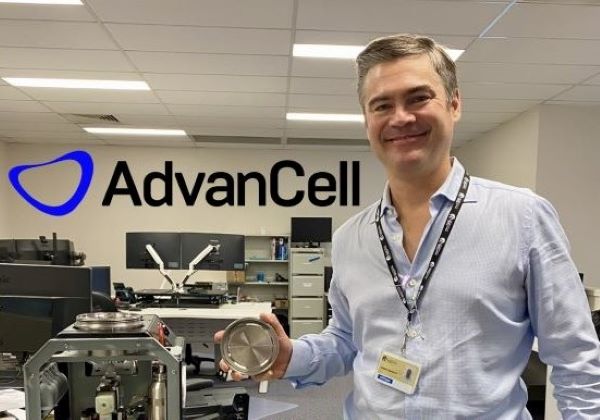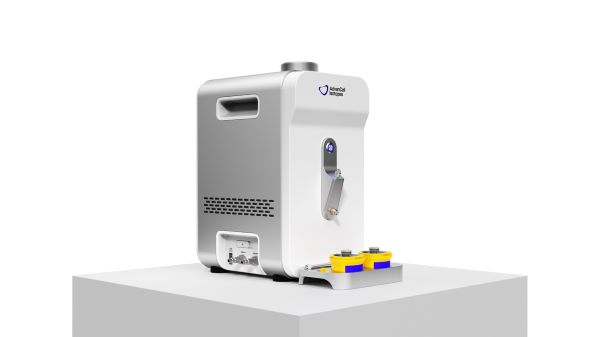NSW company develops bold new way to attack cancers
Rapidly developing Sydney-based company AdvanCell Isotopes is one of only three companies to receive funding in 2021 from the NSW Health Medical Devices Fund.
Around the world, universities, medical researchers and MedTech companies are striving to find new and better ways to treat cancer. A fast-growing NSW-based company, AdvanCell Isotopes, has developed technology that could change cancer treatments forever with advances occurring in late 2021. The company recently received a $2.1 million grant from the NSW Health Medical Devices Fund.

Image courtesy of AdvanCell.
AdvanCell’s unique technology includes a small isotope generator. As radioactive isotopes decay naturally, alpha or beta particles are emitted. By harnessing the power of these particles and attaching the isotopes to a molecule that will target cancer cells, scientists can produce a radiopharmaceutical that can target specific cancer cells and destroy them.
In this multibillion-dollar industry, much attention has been focused on radiopharmaceuticals that emit beta particles, but AdvanCell is focusing on alpha particles, which have more firepower. They’re capable of breaking both strands of a cancer’s DNA, not just one.
“Alpha particles have 8000 times the mass of beta particles and they travel a far shorter distance. So, they’re much more likely to destroy a cancer cell, with fewer off-target effects,” says AdvanCell’s Managing Director Andrew Adamovich. “We believe targeted alpha therapy will be very effective, and with a superior safety profile.”
Fund provides crucial support
Only three companies received grants from the Medical Devices Fund this year. The Fund, which invests in the development and commercialisation of medical devices and related technologies in NSW, has been running since 2013. It has so far awarded more than $70 million to start-up companies, some of which have gone on to huge commercial success and paid back the funding.
“It’s extremely important,” Andrew says of the funding. “The radiopharmaceutical market is developing very quickly and the grant enables us to stay ahead of the curve.”
AdvanCell also has secured substantial funding from US venture capital firm Morningside. “They are one of the most highly regarded investors in biotechnology globally,” Andrew says. With a laboratory at the University of Newcastle and other facilities in Queensland and Adelaide, AdvanCell has a two-pronged business plan: development of the easy-to-install device and an initial treatment for metastatic prostate cancer.
The size of a home coffee machine, the isotope generators will first be operated in Australia to support clinical trials, drug development and compassionate use.
Discussion is underway about extending production to the US and Germany, so life-saving cancer drugs can easily be made using the devices in multiple locations around the world.
In December, the first generator – developed and assembled in NSW – will be loaded with its feedstock parent isotope which decays into the isotope of lead that AdvanCell calls Alpha-212. “We could be producing lead by the end of the year, which would be a huge Christmas present,” Andrew says.
One of the many advantages of the mineral they’re looking to use as a parent isotope is its wide availability internationally. In collaboration with the CSIRO, AdvanCell is investigating whether Australian mineral resources could directly supply the parent isotope to reduce reliance on foreign supply chains.

Reducing treatment impacts
Another advantage is that Alpha-212 has a very short half-life of only 10.6 hours. “So within 50 hours of using it, it’s completely gone from your system,” Andrew says. “Because it’s an IV injection it means that you can get treated, then go home and play with your kids, because it isn’t expected to have a lingering negative impact like current treatments do.”
Clinical trials for the prostate cancer drug are due to start in 2022. Andrew says the world-class team at AdvanCell, which includes nuclear scientists, clinicians and radiochemists, is ready for the challenges ahead. “We know how to do these trials. Our team has significant clinical trials experience.”
But he emphasises that the prostate cancer drug is only the first of many that could be created from the game-changing technology. The alpha-emitting isotope could be paired with any number of drugs that target particular cancers, including melanoma, pancreatic and breast cancers. “We’re looking to change the course of cancer treatment,” Andrew says. “Our technology has many applications. It’s very exciting to think we could have treatment for cancers that currently there are no real treatment options for.”
Updated 4 years ago